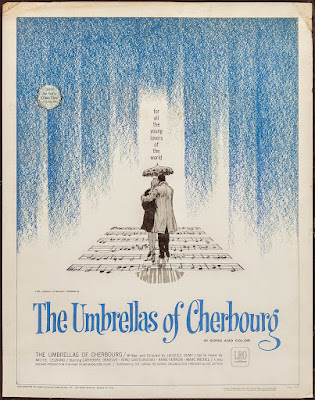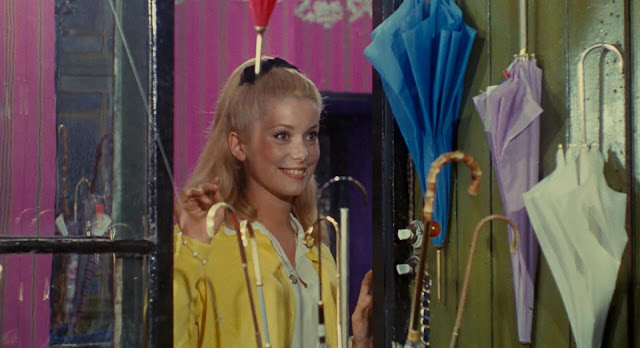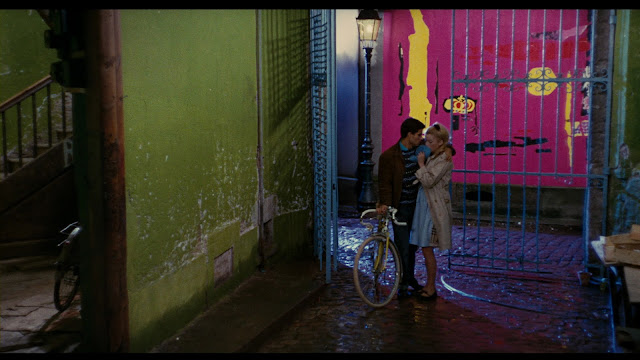One of the things about speaking in a new language is that you are released from your inhibitions. When I served as a missionary in Mexico for two years the first big challenge I had to overcome was, of course, speaking Spanish. I wasn't fluent and even after a solid two months of intensive language preparation, I still was only at a basic high school level. When I arrived in the country, however, I was paired with a native speaker that knew no English. And so with complete immersion (all I did all day was walk around and talk to people) I was soon dreaming in Spanish. That's when I found I began to speak more openly about emotions and feelings, both in what I shared and in what I asked about. It's a more direct, less complicated language and I had none of the social training that would've taught me to cringe at a curse word or shy away from direct expression.
Watching The Umbrellas of Cherbourg, a film where 100% of the lines are sung, was a similar language-learning experience. My impression of the singing style was awkward, at first. I don't know French so one issue is that I initially struggled trying to fit the English subtitles somewhere into the music. There's a learning curve that comes through the length of the film. What seemed strange at first and without melody, turned into a new dialect, of sorts, with an underlying bit of fantasy and a more direct emotional connection. As I succumbed to the constraints and rules of this mode of expression and stopped looking for the old musical language I knew, I began to really enjoy it.
 The singing is sweet but the actors aren't virtuosos. There is none of the showboating of the big Hollywood musicals of the era. Demy reasoned that in traditional musicals you have starts and stops of the story with a cycle of exposition, dialogue, then song, then the story continues until it stops for another song, and so on. His goal was to create a musical atmosphere that flows continuously throughout the film's running time. While I still love the bombastic showtune-style of the greatest musicals like Singing In The Rain, Umbrellas uses music in a different way. It is the more direct influence of the recent hit La La Land, so if you liked that and want more or it didn't fully connect and you want to understand where it's coming from, watch this 50 year old predecessor that broke that ground first.
The singing is sweet but the actors aren't virtuosos. There is none of the showboating of the big Hollywood musicals of the era. Demy reasoned that in traditional musicals you have starts and stops of the story with a cycle of exposition, dialogue, then song, then the story continues until it stops for another song, and so on. His goal was to create a musical atmosphere that flows continuously throughout the film's running time. While I still love the bombastic showtune-style of the greatest musicals like Singing In The Rain, Umbrellas uses music in a different way. It is the more direct influence of the recent hit La La Land, so if you liked that and want more or it didn't fully connect and you want to understand where it's coming from, watch this 50 year old predecessor that broke that ground first.Umbrellas is fund of beautiful melodies and musical lines, but there is no delineation between separate songs. Instead it is one continuous musical experience. Demy and composer Michel LeGrand literally sat down at a piano with the screenplay and a blank sheet of music paper side by side and went through, page by page, adding notes to the written lines. In an interview, LeGrand admitted to struggling through the process. A key breakthrough came as a bit of inspiration when they translated the natural timbre of the spoken line for a scene, keeping the same rhythmic melody. That became the one truly memorable musical theme from the film, and the rest followed. The core meaning of the words and action are paired with the emotional message of the music. For me, the effect took root and started to swell as the story progressed. And yes, there is a story. It's about young love, loss, and the path that life leads. It's almost a "tale as old as time."



No comments:
Post a Comment